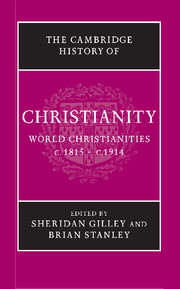Book contents
- Frontmatter
- 1 Introduction
- PART I CHRISTIANITY AND MODERNITY
- PART II THE CHURCHES AND NATIONAL IDENTITIES
- 14 Catholic Christianity in France from the Restoration to the separation of church and state, 1815–1905
- 15 Italy: the church and the Risorgimento
- 16 Catholicism, Ireland and the Irish diaspora
- 17 Catholic nationalism in Greater Hungary and Poland
- 18 Christianity and the creation of Germany
- 19 Anglicanism, Presbyterianism and the religious identities of the United Kingdom
- 20 Protestant dominance and confessional politics: Switzerland and the Netherlands
- 21 Scandinavia: Lutheranism and national identity
- 22 ‘Christian America’ and ‘Christian Canada’
- 23 Spain and Portugal: the challenge to the church
- 24 Latin America: the church and national independence
- 25 Between east and west: the Eastern Catholic (‘Uniate’) churches
- PART III THE EXPANSION OF CHRISTIANITY
- Select General Bibliography
- Chapter Bibliography
- Index
- References
19 - Anglicanism, Presbyterianism and the religious identities of the United Kingdom
from PART II - THE CHURCHES AND NATIONAL IDENTITIES
Published online by Cambridge University Press: 28 March 2008
- Frontmatter
- 1 Introduction
- PART I CHRISTIANITY AND MODERNITY
- PART II THE CHURCHES AND NATIONAL IDENTITIES
- 14 Catholic Christianity in France from the Restoration to the separation of church and state, 1815–1905
- 15 Italy: the church and the Risorgimento
- 16 Catholicism, Ireland and the Irish diaspora
- 17 Catholic nationalism in Greater Hungary and Poland
- 18 Christianity and the creation of Germany
- 19 Anglicanism, Presbyterianism and the religious identities of the United Kingdom
- 20 Protestant dominance and confessional politics: Switzerland and the Netherlands
- 21 Scandinavia: Lutheranism and national identity
- 22 ‘Christian America’ and ‘Christian Canada’
- 23 Spain and Portugal: the challenge to the church
- 24 Latin America: the church and national independence
- 25 Between east and west: the Eastern Catholic (‘Uniate’) churches
- PART III THE EXPANSION OF CHRISTIANITY
- Select General Bibliography
- Chapter Bibliography
- Index
- References
Summary
On 21 July 1815 a large crowd assembled to witness the admission of a celebrated new parish minister to the charge of the Tron Church in the centre of Glasgow. Thomas Chalmers (1780–1847) was already one of the leading figures in the evangelical party in the Church of Scotland and was destined to play a central role in events and movements that had a profound impact on religious life and identities, in Scotland above all, but also throughout the United Kingdom. Chalmers’s move to Glasgow in the month after Waterloo symbolises and illustrates, moreover, the great challenge of rapid urban growth facing both the Church of Scotland and the Church of England in 1815. His previous parish, Kilmany in Fife, was rural and predominantly agricultural with a declining population, amounting to only 787 in 1811. In such an environment it remained relatively easy for an energetic pastor like Chalmers to develop a ministry that brought him and the Church of Scotland into meaningful contact with all his parishioners. Glasgow on the other hand had tripled in population – from 40,000 to over 120,000 – during Chalmers’s own lifetime, and his own parish had a population of approximately 11,000, many of them Dissenters from the national church, and many others lacking any contact with organised Christianity. Such was Chalmers s concern at these unchurched multitudes that in November 1817 he turned a memorial sermon on the tragically early death of the king’s granddaughter, Princess Charlotte, into an appeal for efforts to bring this enormous physical strength under the controul of Christian and humanized principle’.
- Type
- Chapter
- Information
- The Cambridge History of Christianity , pp. 301 - 322Publisher: Cambridge University PressPrint publication year: 2005

